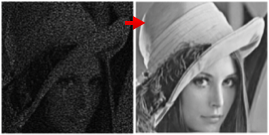Deep Learning for Image Inpainting
Autumn 2017
Master Diploma
Project: 00349

Image inpainting recovers missing information within images, for instance the data underlying blemishes from antique pictures. Another use is to counteract photo bombers by allowing for the erasure of unwanted elements. The most recent inpainting methods rely on various optimization methods, in particular, on iterative convex optimizers. However, this type of optimization methods are computationally demanding.
Nowadays, convolutional neural network (CNN) are becoming a popular solver of various inverse problems in the framework of supervised deep learning. It is observed that the performance and speed of reconstruction of CNN are noticeably improved compared to conventional iterative optimization methods. However, until now, there is a lack of CNN approaches for image inpainting. The student's task will be to explore a CNN-based reconstruction method. The implementation will take advantage of the MatConvNet toolbox of MATLAB.
- Supervisors
- Kyong Jin, kyong.jin@epfl.ch, 021 693 5189, BM 4.135
- Michael Unser, michael.unser@epfl.ch, 021 693 51 75, BM 4.136